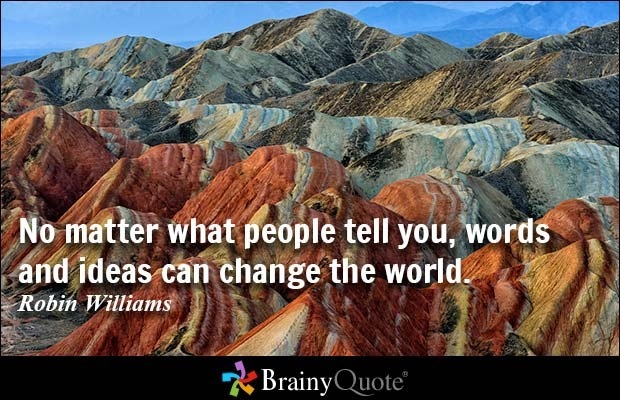Exploring Imaginative Ideas*
Ali Anani wrote, *Imaginative Ideas- Time to Explore. And as with most of Ali Anani's posts, I found myself drawn into his words and ideas and realized that my comment had to be written "out of the comment box".

I am going tell you my “idea” first, and then write about how I “imagined” that to be.
Knowledge is the sense of the physical dimension and imagination is the sense of the spacetime dimension.
As the amniotic fluid is a greater sound carrier than water, our sensory environment begins in utero. As well as the auditory stimulation that occurs, the fetus experiences movement. After birth, our experiences continue to be shaped, formed and influenced by what we hear, see, smell, taste, touch, as well as experience proprioceptively and vestibularly. Ornstein writes in his book The Psychology of Consciousness, (1972) that "the experience of an infant is a confusing sensory cacophony." Our Central Nervous System is continuously, perceiving, sorting, choosing and responding to information received through our sensory system.
Over the years, we collect and store these experiences. We construct and form memories. Dr. Sawyer (2006) makes the provocative claim that great creativity is based in great memory.
Imagination
One skill that we acquire is the ability to imagine. According to Michele and Robert Root-Bernstein, (2009) imaging is the most important thinking skill we acquire for creativity. They define imaging as the ability to recreate sensory impressions and feelings in our minds in the absence of external stimuli.
We can alter, combine, synthesize and otherwise manipulate sensory images to form images and ideas of things never perceived in reality.
Ali Anani writes: “We talk so much about ideas generation, but very little about imaginative ideas even though they would provide us with unlimited possibilities.”
We define idea as: “a thought or suggestion as to a possible course of action.”
We define imagination as: “the faculty or action of forming new ideas, or images or concepts of external objects not present to the senses.”
So here we see the connection between idea and imaginative ideas discussed by Dr. Ali: action. Idea leads to action while imagination is the action of forming something not present to our senses.
Dr. Ali continues by discussing that which we describe as real versus imagined. The critical aspect is the idea of enabling imagination to be seen: “…imaginations that became visible. Just imagine combining non-integer dimensions with imaginary numbers (two wild imaginations) that led to the pioneering work of Mandelbrot with his most beautifully ever produced the fractal strange attractor.”
Dr. Ali goes links imagination to knowledge and asks us to “go beyond our limited senses and knowledge.”
I took on Dr. Ali’s call to action and have gone beyond our limited senses and knowledge. This is my idea of what I imagine makes sense to me.
Sensory systems differ in humans and animals. We each have our own range and capacity to perceive sensory input. I often speak of the importance of being aware of our own sensory fingerprint; how we make sense of our world and our engagement within it.
We turn to nature and “mimic” senses which are available to other species but not to ourselves; we may not have the ability of bats to see in the dark but we can mimic their sense of “hearing” or echo location.
Beyond our senses.
Asking “why” differentiates us from other species. All animals can respond to the questions:
What (identifying/recognizing) – was that sound?
Where (direction/location) – do I go for shelter?
When (time) – I have to go find a mate.
Who (other) – do I choose to fight?
Which (selection) – is my pack?
How (action) – will my cub get food?
Only humans ask Why - was I born, am I here, did this happen to me, do I feel this way, are there stars in the sky?
We would not be able to attempt to ask or answer why unless we could imagine; imagine beyond our limitations and capacities to sense and know.
A classic question exists in philosophical discussion and exploration of human perception and reality: “If a tree falls in the forest and no one is there, does it make a sound?” My answer is no because the sound exists as a vibration and can only be heard through the auditory sensory system of the human/animal; the ear senses the vibrations and the brain tells us what we are hearing. So if there is no ear/brain to hear the vibration, there is no sound.
Nothing, no aspect of life, no dimension, can be experienced without sensation. The early sensations were attributed to the 5 senses of seeing, hearing, smelling, tasting and touching. In his work, Rudolph Steiner identified twelve senses: balance, or equilibrioception [or vestibular]; movement, or proprioception; pain/well-being, or nociception, also called life sense; touch, or tactition; taste, or gustation; smell, or olfaction; warmth, or thermoception; sight, or vision; hearing, or audition; word / speech; thought / concept; ego / self.”
I have written about time as a sense and now add knowledge and imagination as senses. I am matching knowledge as a sense to the physical dimension and imagination as a sense to the spacetime dimension.
Physical Dimension
All that we know of in our physical dimension we have learned from our sensory experiences and the associations and meanings formed by our central nervous system.
For example, what does it mean to be standing at a red traffic light?
1. We see the red traffic light.
2. We know what colour is and that this light has the colour red.
3. We know that red means stop.
Knowledge is the sense that allows us to engage in our physical dimension.
Spacetime Dimension
Everything we imagine is built upon what we have experienced in our physical dimension. But it is because we can then project/propel beyond the physical space, “outside” our physical reality, and time, beyond the past learning and present experience, that imagination is the sense that allows us to engage in our spacetime dimension.
Dr. Ali quotes Albert Einstein: “Imagination is more important than knowledge. Knowledge is limited. Imagination encircles the world.”
Thanks to Chris Kovacs, I am beginning to learn about machine learning. In 1959, Arthur Samuel defined machine learning as a "Field of study that gives computers the ability to learn without being explicitly programmed". The only way machines can learn is through the "experience" of human input. Advanced function can enable the computer to use previously obtained input and learn from that data. It is still dependent on human input. A computer can not imagine beyond its data. For humans to detach from our ability, our sense to imagine, is a regression in human development.
What has feelings got to do with all this?
We can’t trust the validity of our thoughts if we are experiencing a feeling such as anger. We lose our clarity of judgment if we engage in thought through anger. And so, we assume in order to be focused and rational, we can’t involve feelings. Imagination is often linked with emotions and so not seen as something to be used when engaged in learning and gaining knowledge. Imagination is not an emotion, it is a sense. And in this way we learn and gain knowledge by engaging all our senses:
- what we see
- what we hear
- what we smell
- what we taste
- what we touch
- how we experience being in proximity to others and objects
- how we experience being grounded or balanced
- how we experience time
- how we know
- how we imagine
Imagination will often carry us to worlds that never were. But without it we go nowhere.
Carl Sagan
My hat’s off to you Ali Anani for being the best of example of what it is like to have imaginative ideas.
Articles from Sara Jacobovici
View blog
In an earlier post I wrote: · CONNECT and ENGAGE, two words associated with social media. You can’t ...

Welcome to Wednesday Word(s) of the Week at beBee: WWW.beBee · My contribution for this week is · a ...

To my dear beBee friends, · As I am (nervously) preparing for my launch, I knew I wanted to make a ...
Related professionals
You may be interested in these jobs
-
We're revolutionizing the way businesses interact with the digital world by revealing to them everything that happens online. Design and build complete end-to-end features that directly impact our users. This role involves working with modern technologies to create both scalable ...
Tel-Aviv2 weeks ago
-
Imagine what you could do here. At Apple, new ideas have a way of becoming extraordinary products, services, and customer experiences very quickly. Bring passion and dedication to your job and there's no telling what you could accomplish. · ...
Haifa1 month ago
-
We are looking for you to join our emulation team focusing on the creation, deployment and support of advanced emulation environments. · ...
Haifa1 month ago


Comments
Sara Jacobovici
9 years ago#19
Much appreciated DILMA BALBI.
Sara Jacobovici
9 years ago#18
Very kind of you to say debasish majumder. Thank you.
Sara Jacobovici
9 years ago#17
Dear Irene Hackett, your kind words are very much appreciated. I feel very fortunate that I have the opportunity to exchange thoughts and insights with you.
Sara Jacobovici
9 years ago#16
If I may but in to your discussion Dale Masters. If I understand you correctly Dale, is it appropriate to state that the universe is conscious of everything about us but we are not yet conscious of everything about the universe?
Sara Jacobovici
9 years ago#15
Definitely Irene Hackett! Awareness, or a conscious state of awareness is that space. You notice I say conscious state because that is what Frankl may be saying: it's not enough to know, we need to be aware; it's not enough to be aware, we need to bring that awareness to consciousness. I have also worked and trained others in the non-verbal therapies that once we use the creative arts to evoke the non-verbal, it is our responsibility as therapists to know what to do with that which we have helped to evoke and allow the individual to find the words to understand and make sense of it on a verbal level. Yes that space can be known, and we're working on that all the time, (consciously and unconsciously) but as long as it is a work in progress, we can only name what we know at the time. Nothing wrong with that.
Sara Jacobovici
9 years ago#14
Thank you for an Irene Hackett comment. I look forward to them! I appreciate all your connections Irene and thank your for your generous words . I'd like to take a stab at your questions: "What senses were in play before the 'Big Bang'? From what did the imagination that formed life, time and space, emerge?" At the risk of oversimplifying, from my perspective, I turn to one of the stories of creation. No matter what your belief system is, the oldest and best selling book is the bible. The story of creation "in the beginning" is a sensory experience; God created through words, God "said", the spoken word produced vibrations (we don't know how these words sounded before the creation of humanity), God "saw", then after God created man, man was able to "hear" God's voice. The story of Eve and the serpent is all sensory based; "hearing" the serpent's voice, "seeing" the fruit, "touching" the fruit when picking it off the tree, "tasting" the fruit. Before Adam and Eve are expelled for the garden, God "clothes" them but there is a reference to placing a "skin" on them; our skin being our largest organ and sensory receptor. In terms of from what does imagination emerge, I believe that the "dark chaos" over which the spirit of God hovers described at the beginning is a possible original space from which imagination emerged. When God asks Adam to name the animals, this is the first use of man's ability to use his imagination; taking what he "knew" about each animal and coming up with their original and unique name. I like to think of 2 human spaces in regard to imagination; our synaptic space between two nerve cells and the space referred to by Viktor Frankl between stimulus and response as areas in which imagination plays a crucial role. Thanks Irene for asking and allowing me the opportunity to freely associate.
Sara Jacobovici
9 years ago#13
I will follow your advice Ali Anani and answer your question as part of my paradox buzz on senses and feelings. Thank you for asking the right questions.
Sara Jacobovici
9 years ago#12
Thanks for taking the time to respond Ali Anani. Looking forward to your future articles.
Sara Jacobovici
9 years ago#11
Great comment and contribution to the discussion Dale Masters. Thank you. Agreed! No one yet understands the mind, but that's the fascinating part of the whole thing; we are using our mind to understand what it is. Being self-reflective is an amazing, "mind boggling" part of being human. I am not surprised that at the same time as discovering epigenetics, we are discussing the mind as an epiphenomenon of the brain. It's always been there, we are just seeing these things, or technology is allowing us to see these things, for the first time. Now re "the benzene molecule"...love the fact that it was discovered in a dream. Often important discoveries and ideas are experienced in a dream state. But what is also exciting for me is the connection between the process of discovery and the hexagonal shape of the molecule. Any connections there @Ali Anani and your description of process of creating the hexagonal shape of the bee hive?
Sara Jacobovici
9 years ago#10
Very thought provoking comment and wonderful contribution to the discussion David Navarro L\u00f3pez. First let me say that you inspired another paradox for me when you write, "You need your feelings as a trigger for your imagination, but you can not trust them to be part of the "equation" ". The paradox is something like: Knowing how to imagine the difference between a sense and a feeling. I am not excluding feelings from imagination, I am just suggesting that imagination can be considered a sense like our other senses. In this way we can "see" without feeling, but then what we see can evoke feelings, as well as, our feelings will influence how we see. Your example of mother/child relationships is a complex one to be sure. It reflects the dynamic process between our innate/instinctual mechanisms of survival and the influences of our sensory experiences and meanings we give to those sensory experiences as we engage in life. I never take the "norm" for granted and am always fascinated when things take a turn in a different direction. Much to think about. Thanks again David.
Sara Jacobovici
9 years ago#9
Thank you Cristiane Bittencourt Spinelli. Your response and share is much appreciated.
Sara Jacobovici
9 years ago#8
Very grateful for your comment CityVP Manjit. I can feel your positive and encouraging energy across the cyber space waves.
Sara Jacobovici
9 years ago#7
So appreciative of you sharing the books and video Chas Wyatt. I look forward to reading the books. About the video...I watched that first before I saw your comment. I got the connection right away. Beautiful piece.
CityVP Manjit
9 years ago#6
Sara Jacobovici
9 years ago#5
Always glad to hear from you . I love the energy and experience you bring to the discussion.
Sara Jacobovici
9 years ago#4
While you are in the process of thinking, I'll just offer one more thought for you to consider Ali Anani. Is not, "being aware" or realizing more connected with consciousness? I look forward to seeing the results of your thinking.
Sara Jacobovici
9 years ago#3
Provocative thought Ali Anani. Off the top of my head, I would see primitiveness more a state of being rather than a sense. What do you think?
Sara Jacobovici
9 years ago#2
Your generous and encouraging comment means a lot to me. Thank you Ali Anani for being the source and resource of my learning.
Sara Jacobovici
9 years ago#1
Much appreciated comment Pascal Derrien. Thank you.